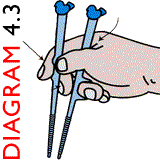Susan Briante
2 POEMS
7TH DAY OF THE RAINY SEASON
Along the Pan American Highway, farmhands wade through fields of roses.
Pills linger on the tongue like moths on water.
Droplets of pollen slip from anther to stamen.
I wait at a tollbooth with market bag and notebook.
A stem's placability should not be mistaken for delicateness.
"Breathe deep," the doctor told me and slid his stethoscope like a coin over my chest.
A seat by the window suffices to stitch the world together.
Consider the number of heartbeats per minute within this pasture of traffic.
Exaggerated mania for identification, writes André Tridon, is a symptom of weakness.
Vaya con dios. Frene con motor.
During a season of vinegary prescriptions, I sketch market produce and bullrings.
When fertilization takes place, ovaries swell, each petal folds like a fist.
Before a sloshing door at the back of the bus, who wouldn't resent the IMF?
Along the Pan American Highway, a beekeeper tends the blue cabinets of his hives.
A billboard celebrates: 300,000 more miles of pavement.
__
CERTAINLY AFTER
the strip mall at the edge
of cornrows glistens
a still wet blade
through the suburbs,
turnsignals, red
pine needles, sedimentary
stones in the fields
certainly after
so much time
you remain
a guardrail
under my ribs, a branch
under my wheels,
this fence severs
nerves of birch trees
our wilderness bleeds
beyond scar, beyond wren,
beyond twig***
A Pontiac Firebird rebounds from the retaining wall. Only 2,000 longshoremen remain at the Port of New York and New Jersey. On the corner, a bully slides from his ten-speed. Lights come on in a bedroom across the street. Radio Marvin Gaye sings. Burn marks along venetian blinds can be taken as a sign. The sideview mirror exposes wires, a gash above your left brow. Hotel chains nest just off Route 22. Birds gather in shipping crates. I come apart, baby. I mean for real, baby. Sunset the color of blood on gauze. Before anything else can be administered. Late for dinner, a boy back-peddles to make the chain hum. Sycamores shiver, black veined, phantom limbed. Perhaps love, perhaps gin. Out the corner of the eye of the world. 2,300 yellow and white trailers. And all of these falling birds.
***
Snow gathers on the north side of the bleachers, softer
now each blunt edge of the water
purification plant, each rusted dumpster, banks
of the misnamed river, softer now
and less of themselves
like a girl who twists in our radio glow,
FM stereo in the passenger seat, her lyrics break:
shadows of chimney smoke across brickface.
Regret must come to God like this
a numbing of line and verb
every twig, mailbox, disposable lighter
an icy stone in the throat
and from his poplars
a loosening of crows.
____
Certain lines in the "Rainy Season" poems are lifted or paraphrased from Psychoanalysis and Love by André Tridon (Brentano's 1922). They are for Roberto Tejada.
On "Certainly After": I'd been working on full-length poetry manuscript entitled "Pioneers in the Study of Motion" while a long-term relationship came to an end. A car crash poem seemed inevitable.
